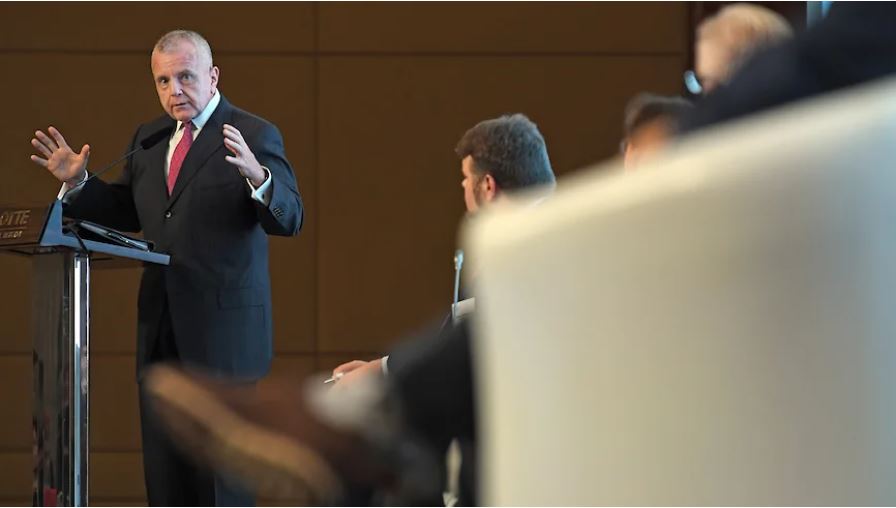RA’s Daily Russia News Blast – September 24, 2020

Today in Russia: Michael Calvey’s chance at release looks dim as authorities fear embarrassment of about-face; EU to Lukashenko: “so-called president”; Lukashenko’s closed-door inauguration leads to more clashes; Russia reports highest COVID-19 spike since July; TikTok admits it deleted Russian LGBT videos at Russian government request; Prigozhin’s Central African interests also sanctioned by US; US Amb Sullivan on Navalny and critical staff shortage; Russian counterpart responds to FinCEN leak
The Financial Times wrote that Michael Calvey, head of Baring Vostok, Russia’s largest foreign-funded investor, is unlikely to have charges dropped and be released from house arrest. Calvey’s arrest is suspected by many to be motivated by a dispute with his former business partner, Artem Avetisyan, who enjoys a close relationship with first deputy prime minister Andrei Belousov. The FT’s sources said back-channel efforts to reach a deal had floundered, with one source noting that Putin had publicly backed the case and defended Avestisyan. As a result, “[Exonerating Mr Calvey] would mean explaining to Putin the case was a mistake and nobody wants to do that.” The FT also noted, however, that Belousov – who apparently is pulling the strings in this instance – “has cooled on Mr Avetisyan and it is believed that he would be open to releasing Mr Calvey after a watered-down conviction, according to a state banker close to security services.”
The European Council released a statement on behalf of all 27 member states that declared Alexander Lukashenko’s inauguration and sixth term as president to be illegitimate. The statement read, “the EU once again reiterates that the 9 August Belarus Presidential elections were neither free nor fair. The European Union does not recognise their falsified results. On this basis, the so-called ‘inauguration’ of 23 September 2020 and the new mandate claimed by Aleksandr Lukashenko lack any democratic legitimacy.”
Belarus police fired tear gas and arrested more than 150 protesters on Wednesday after the secret inauguration of President Alexander Lukashenko led to new demonstrations and clashes [in Russian] with police.
Russia reported its highest rate of new COVID-19 cases since July 13, with 6,595 new positive tests [in Russian], the sixth day in a row [in Russian] that the figure is over 6,000. Moscow reported over 1,000 new cases [in Russian] for the first time since June 23.
TikTok admitted that it had taken down hundreds of Russian videos with LGBT content at the request of Russian authorities. Referencing Russia’s 2013 “Gay propaganda” law, TikTok’s director of government relations and public policy in Europe Theo Bertram told the British Parliament on Tuesday in testimony, “I think the Russian law is terrible and our community does too, and they strongly voice that on the platform…But unfortunately we have to comply with the legal requests in the country we operate.”
Yevgeniy Prigozhin, and eight entities connected with him as well as Russia’s security service the FSB were sanctioned on Wednesday by the US Treasury. Prigozhin has already been subjected to sanctions due to his alleged involvement in the secretive private military company Wager Group in 2018 and 2019. “The latest sanctions target two mining businesses and three employees tied to Prigozhin in the Central African Republic, which has struggled with instability and armed conflict since President Francois Bozize was ousted in a coup in 2012.”
US Ambassador to Moscow John Sullivan spoke at the 20th annual investment conference of the American Chamber of Commerce in Russia. He fretted about the severe shortage [in Russian] of diplomatic staff since both countries entered into a tit-for-tat fight resulting in very small allotments for diplomats on both sides. “According to John Sullivan, at the moment his diplomatic mission numbers 455 people, of which about 80 are teachers of the Anglo-American School in Moscow. About 200 more people are citizens of the Russian Federation who work in the embassy. And only 180 people are US citizens, some of whom are diplomats and some are technical staff. John Sullivan said that before the diplomatic war, the embassy employed more than 1,200 people.”
Ambassador Sullivan also spoke of the effect of Navalny [in Russian] and other issues on US-Russia relations. Sullivan remarked that “My former boss Rex Tillerson came to Russia in the spring of 2017, and at a press conference with Russian Foreign Minister Lavrov said that we had reached the lowest point in bilateral relations, we need to stop digging this hole and start looking for ways of cooperation. Unfortunately, over the past three years, the pit has only gotten deeper.” Russia’s ambassador to Washington Anatoly Antonov remarked to TASS that “We are ready for the development of relations to the same extent as our American colleagues are ready. So far we do not see such a great desire.”
The Federal Financial Monitoring Service (Rosfinmonitoring) commented [in Russian] on the leak of classified files of the US Financial Crimes Network (FinCEN), which contained data on banking operations in Russia. They said that the Russian authorities were checking suspicious transactions, and in some cases criminal cases were initiated. The statement read,
Earlier, the media published an investigation into the secret documents of the US financial intelligence about dubious transactions in American banks, in which Russian billionaires appeared. It followed [in Russian] from these data that FinCEN receives information even about transfers between Russian banks. This happens when an operation is flagged as suspicious. References in reports do not necessarily indicate violations.
PHOTO: US ambassador to Russia John Sullivan addressed the 20th annual investment conference of the American Chamber of Commerce in Russia (Dmitry Dukhanin/Kommersant).











